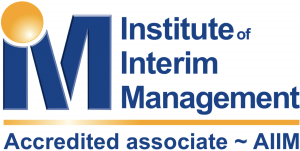Interim Management – An Introduction
Interim Management is the use of a highly experienced and specialised individual. This is often undertaken to help a business over a short period time. An Interim Manager is normally used to temporarily fill a skills gap in your workforce. Alternatively they may also be used in periods of change.
Interim Management differs from Management Consultancy in a number of ways. The most important difference for us is that an Interim Manager will implement and not simply recommend. This is undertaken hand in hand with your workforce and not with external sources.
Associate Member of the Institute of Interim Managers 
As an Associate Member of the Institute of Interim Managers (AIIM) my experience has been externally validated. My personal focus for over 25 years has been on Sales, Marketing and Data. This ensures Wyndham Software are a Safe Pair of hands for your Interim Management needs.
The 5 Stages of Interim Management
The aim of using an Interim Management solution is to ensure that it arrives quickly. And then engages effectively for as long as required. Finally leaving your business.
This is a typical assignment lifecycle:
Entry
With a problem identified a business (you) engage with an Interim Manager. Initial contact explores the requirement sufficiently for you to decide whether or not to engage the Interim Manager.
Typically this stage will unfold over a number of meetings or discussions. As part of the process you will most likely include an assessment of what you require. Alongside this you will most discuss the boundaries of the Interim Managers contribution.
Diagnosis
With Interim Management now in place a process is initiated. Diagnosis may run alongside the handling of immediate problems. There is research into the situation and a greater understanding is obtained.
The research will often include multiple stakeholder groups, with different perspectives. The outcome of this state is to understand the situation fully and form possible ways to address it.
Proposal
Your Interim Manager will now use their experience and expertise in order to present a more detailed proposal. With plans and objectives based on the findings of the Diagnosis stage. It may be the case that the proposal differs from the initial brief.
This is because Interim Management will at this stage be putting forward a proposal based on how effective it will be. Ultimately, they are expecting to be judged based on the results achieved.
Implementation
Working in conjunction with our current workforce, in teams or as individuals. Your Interim Manager will now take responsibility for managing the project. Focused on the task at hand Interim Management will get as close to the situation as they can, whilst remaining independent.
As a result they will be filling gaps in your team, whether that be as a Director, Manager or Executive. During this phase they will also be looking to educate your workforce.
Exit
As the assignment comes to an end, your Interim Manager will ensure objectives have been met. It is important that you are satisfied that this is the case. There will most likely still be skills transfer taking place.
You may also be undertaking the sourcing of ‘business as usual’ successors and sharing lessons learned.
Focus on Specialist Areas
Interim Management services are always based on the skills and experience of an individual. This is the case with myself and Wyndham Software. Our primary disciplines are Sales, Marketing and Data Management.
As a result we are a excellent fit for the following:
Sales and Marketing Within the following Roles
- Interim Sales Manager or Interim Sales Director – See Experience
- Interim Marketing Manager or Interim Marketing Director – See Experience
- Interim Sales and Marketing Manager or Interim Sales and Marketing Director
Data Management Withing the Following Roles
- Interim Data Manager – See Experience
- Interim GDPR Manager – See Experience
Additional Board Level Roles
- Interim Managing Director – See Experience
- Interim CEO – See Experience